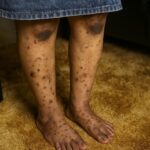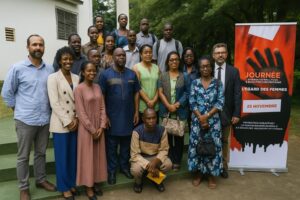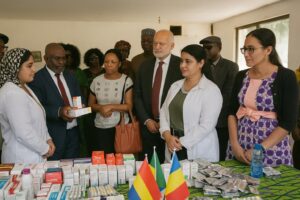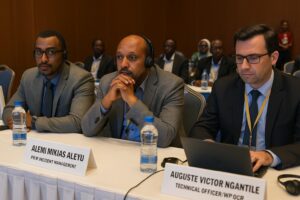Brazzaville neighbourhood jolted by early morning assault
The usually calm Château d’Eau sector of Makélékélé woke to sirens on 2 October after residents heard cries coming from a modest family home at dawn. Inside, witnesses say a 20-year-old woman lay bleeding heavily from deep machete cuts to her forearm.
Police officers from the first arrondissement, alerted by neighbours, cordoned off the street within minutes. “People were shocked; no one expected a weapon like that to appear in a domestic argument,” said Pascal Oba, a shopkeeper who opened early for bread deliveries.
Investigators later confirmed that the alleged assailant is the victim’s partner and father of her five-month-old daughter. The man had arrived unannounced, intending to take the infant to a medical appointment on his own, sources close to the family reported.
Domestic tensions over infant care ignite violence
Relatives recount that disagreements over the baby’s treatment had strained the couple for months. The young mother had returned to her parents’ home in August to escape repeated verbal and physical altercations, according to her 17-year-old sister.
“My sister told him she needed to explain the child’s health history to the doctor,” the sibling recalled. “He refused, lost his temper and swung the machete he uses for construction work.” The blade struck as the mother shielded herself, leaving muscle and tendon exposed.
Social workers note such conflicts often escalate when childcare decisions collide with economic stress. “When parents disagree on health costs, frustration can turn violent,” explained Mireille Bemba of the Brazzaville Family Support Centre, citing previous counselling cases.
Rapid medical response likely saved limb
Neighbours bundled the injured woman into a taxi and rushed her to a nearby private clinic before an ambulance could arrive. Dr. Léon Mabiala, the attending physician, said the gash narrowly missed a major artery. “She lost a lot of blood, but suturing within the golden hour prevented permanent disability,” he confirmed.
Clinic staff recorded her condition as stable after intensive cleaning, antibiotics and twelve stitches. She remains under observation for infection. A paediatric nurse also examined the baby, who was unharmed and is scheduled for her follow-up appointment later this week.
Health officials praise the community’s quick reaction. “Early intervention makes the difference between life and death in machete wounds,” noted Dr. Mabiala, urging residents to memorise emergency numbers and basic first-aid steps.
Authorities urge communities to report abuse early
Makélékélé district police say the suspect fled on foot but was arrested the same afternoon near the Talangaï bus terminal after an anonymous tip. He is now in custody awaiting an initial court appearance on charges of aggravated assault.
Captain Rodrigue Ngoma of the Brazzaville police emphasised that repeat violence rarely stops without outside help. “We encourage families to alert us at the first sign of threats,” he said, adding that neighbours can file reports without revealing their names.
Local leaders echo that message. Makélékélé’s mayor, Charline Ntsimba, called the incident “a painful reminder that silence protects aggressors.” She highlighted existing hotlines operated in partnership with the Ministry of Social Affairs that provide mediation and legal guidance.
Support networks available for survivors
Several NGOs have offered psychological counselling to the victim and her relatives. Les Sœurs pour la Paix, a women’s association active in Brazzaville, plans weekly visits. “Trauma does not vanish once wounds close,” insisted coordinator Grâce Mavoungou, citing research on post-attack anxiety.
Legal aid group Droits et Dignité says it will assist the young mother in applying for a restraining order and child support. “Our courts recognise the importance of protecting mothers while ensuring fathers meet their parental responsibilities,” stated lawyer Josiane Ouesso.
Community churches are also mobilising. Father Ulrich, parish priest at Sainte-Bernadette, announced a fundraising drive to cover lingering medical bills. “Solidarity is our first duty,” he told congregants on Sunday, urging vigilance against domestic abuse.
Preventing gender-based violence starts at home
Experts argue that education remains the strongest shield. The Ministry of Promotion of Women and Integration of Youth runs workshops in schools and markets, teaching non-violent communication and conflict resolution. Attendance in Makélékélé has doubled this year, according to ministry data.
Sociologist Évariste Iyambo believes challenging stereotypes is crucial. “Many young men still equate authority with force,” he said. “Showing positive models of fatherhood can reduce aggression.” He advocates for father-infant bonding programmes in community health centres.
As the 20-year-old recovers, her story resonates beyond Château d’Eau. Neighbours, officials and activists hope the outrage transforms into lasting change, so future disputes end not with blades, but with dialogue and care for the children at the heart of every family.





















